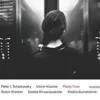
COMPOSERS: Kissine,Tchaikovsky LABELS: ECM WORKS: Kissine: Zerkalo; Tchaikovsky: Piano Trio, Op. 50 PERFORMER: Gidon Kremer (violin), Giedré Dirvanauskaité (cello), Khatia Buniatishvili (piano) CATALOGUE NO: ECM 476 4171
Victor Kissine’s Zerkalo (The Mirror), composed in 2009 and dedicated to the performers on this warmly engineered release, proves to be an intriguing companion piece for the Tchaikovsky Piano Trio. A compelling and emotionally varied work which draws its inspiration from two lines in Anna Akhmatova’s Poem Without a Hero, it begins with a sequence of fragmentary melodic ideas which gradually develop a coherent force as they gather momentum before disintegrating into a shadowy and bleak coda.
Gidon Kremer and his colleagues deliver a powerfully projected performance which in its more elegiac moments emphasises certain musical gestures that can even be related back to the earlier work. Indeed I would go so far as to suggest that their interpretation of the Tchaikovsky is inflected by a similar modernist aesthetic bringing into focus the music’s highly original narrative and its astonishingly resourceful approach to colour.
In contrast to the famous 1988 DG recording in which Kremer was partnered by Argerich and Maisky, the present performance steadfastly avoids emotional hyperbole. Instead we get a much leaner string tone and an almost Mozartian lightness of touch in the piano. The players’ decision to demonstrate the linear nature of the music proves illuminating, quashing the notion that Tchaikovsky’s work is burdened by virtuosic rhetoric. Erik Levi

